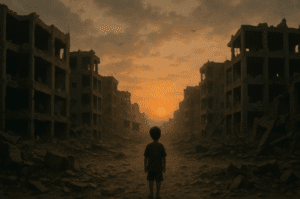Gaza’s Humanitarian Crisis: 183,800 Dead, Famine Looms Amidst Failed Diplomacy and Global Inaction
Gaza faces a deepening humanitarian catastrophe after 569 days of relentless assault, with over 183,800 Palestinians dead, injured, or missing, and famine looming due to Israel’s aid blockade. Recent Israeli airstrikes killed at least 100 civilians, including 22 members of the al-Khour family, reflecting a brutal pattern of indiscriminate targeting under new rules of engagement. Cease-fire talks remain futile, as distrust and conflicting demands stall progress, while ICC arrest warrants for Israeli leaders underscore rising global outrage.
Israel’s strikes on Lebanon further risk igniting a regional war. As Gaza’s health system collapses and children die of starvation, international inaction grows more damning. Urgent steps—like enforcing humanitarian corridors, bolstering legal accountability, and translating global protests into policy shifts—are critical. Gaza’s suffering has become a profound moral crisis, forcing the world to confront its failure to uphold basic human rights.

Gaza’s Humanitarian Crisis: 183,800 Dead, Famine Looms Amidst Failed Diplomacy and Global Inaction
The streets of Gaza echo with grief once more as Israeli airstrikes over the weekend claimed at least 100 Palestinian lives, including 22 members of the al-Khour family, obliterated while seeking shelter in their Gaza City home. This latest surge of violence underscores a grim reality: after 569 days of relentless assault, Gaza’s civilians remain trapped in a cycle of devastation with no end in sight.
The Human Toll Beyond Headlines
Behind the staggering death toll lie stories of unimaginable loss. Saed al-Khour, whose family perished in the bombing, rejects Israel’s claim that a Hamas militant was present. “We pulled out the remains of children, women, and elderly,” he told reporters, a sentiment echoed by survivors across Gaza. The strike on a Khan Younis tent camp, which killed eight, including three women and two children, highlights a chilling pattern: Israel’s revised rules of engagement, enacted after October 2023, permit unlimited civilian casualties when targeting even low-ranking Hamas members. Critics argue this policy has normalized the indiscriminate killing of non-combatants.
The numbers paint a dire picture:
- 183,800+ Palestinians dead, injured, or missing since the siege began.
- 2 million+ displaced, many multiple times, with makeshift tents now spanning rubble-strewn landscapes.
- Famine looms as Israel’s blockade strangles aid, with the UN accusing it of weaponizing starvation. “Children in Gaza are starving… politically motivated,” UNRWA stated starkly.
Cease-Fire Talks: A Cycle of Futility
Recent negotiations in Cairo and Qatar have yielded little progress. Hamas insists on a hostage-prisoner exchange, full Israeli withdrawal, and a lasting truce. Israel demands unconditional hostage release before considering pauses. The collapse of January’s cease-fire—broken unilaterally by Israel—has eroded trust, leaving mediators grasping for leverage.
Meanwhile, the International Criminal Court’s (ICC) arrest warrants for Prime Minister Netanyahu and former Defense Minister Gallant for alleged war crimes hang over discussions. While symbolic, the warrants underscore growing global scrutiny of Israel’s tactics, even as the U.S. continues military and diplomatic backing.
Regional Escalation: Lebanon in the Crosshairs
Israel’s weekend strikes on Lebanon—targeting Hezbollah sites near Beirut—risk inflaming regional tensions. Violating November’s fragile cease-fire, the attacks signal Israel’s broader strategy: preemptively neutralizing perceived threats, regardless of borders. Hezbollah, holding an arsenal of precision missiles, poses a formidable threat, yet retaliatory strikes could ignite a wider war, further destabilizing the Middle East.
The Moral Reckoning
The al-Khour family’s tragedy is a microcosm of Gaza’s suffering. With hospitals decimated, clean water scarce, and food aid blocked, survival itself has become a daily battle. The ICJ’s genocide case against Israel hinges on evidence of intentional deprivation, a charge Israel vehemently denies. Yet, as Gaza’s health system collapses, infectious diseases surge, and children die of malnutrition, the world’s inertia speaks volumes.
Pathways to Hope?
Diplomatic breakthroughs remain elusive, but alternatives exist:
- Pressure to Restore Aid: Humanitarian corridors must be enforced, with third-party oversight to bypass political bottlenecks.
- Accountability Mechanisms: Strengthening the ICC’s mandate could deter further atrocities.
- Grassroots Advocacy: Global public outrage, as seen in worldwide protests, must translate into policy shifts, particularly in the U.S. and EU.
Conclusion: A Test of Humanity
Gaza’s plight is not just a political conflict but a moral crisis. Each bombed tent, each starving child, and each shattered family challenges the international community’s commitment to human rights. Without urgent action, history will judge this moment not merely as a failure of diplomacy, but of humanity itself.
As cease-fire talks falter and bombs continue to fall, one question lingers: How many more al-Khour families must die before the world says “enough”?
You must be logged in to post a comment.